How about it? It is natural that when someone starts up in GNU / Linux, they suffer from versionitis, there are those who do not.
For example, I started in Ubuntu, I wanted to know other distributions but I always stayed in Ubuntu, but given the decisions that Canonical makes about this system, and being that it is possible that remove alternate installation, and being a little paranoid, it could also be to lose the minicd, and since I have been doing minimal installations for a long time, I am starting to test other systems for a possible migration.
My first option is debian, but nothing happens to me if I see other options, one of those is GhostBSD.
I wanted to install FreeBSD a long time, but I had no experience and I wanted to take time to learn, so I told myself that it was time to try a BSD.
So let's get to work, download the GhostBSD-3.0-BETA1-lxde-i386.iso, for about 2 months, but until now I had not installed it.
The first thing is the screen where it gives us the boot options:
Either we let the timer go to zero or demos enter starts the live cd, once started we can see a desktop without so many icons on it, in addition to having the typical LXDE background.
This distribution has more options to change the wallpaper than those offered by other distributions with LXDE
Despite being on live cd it is really fast, I surfed the internet, for a while, and it didn't slow down at all
So having read and having the FreeBSD installation manual (ghostBSD is based on FreeBSD) I started the installation, the first thing is to select the language, then the keyboard layout
when partitioning I left the option to use the full disk since it is virtualized and I do not have another operating system installed
once partitioned, we are asked for user data, root password, etc.
After a confirmation window
When we press install the same proceeds
at this point I realized that I did not use the installation manual, this part is the longest, once it finishes we are asked to restart
when restarting we have the system with the characteristic of LXDE, light, not very loaded
I must say that the installation goes beyond easy, few steps, great work on the part of the developers.
During the start of the live cd and the installed system, there is a process that says more or less 8 because of the speed, I cannot read it well) driver wireless configuration, it gives me that I do not have, but it will be because I am in virtualbox, I do not I know.
The first impression I received during the testing and installation process is very good,
This is a good option for any user who starts with the concern of looking for options to Mswindows.
regards
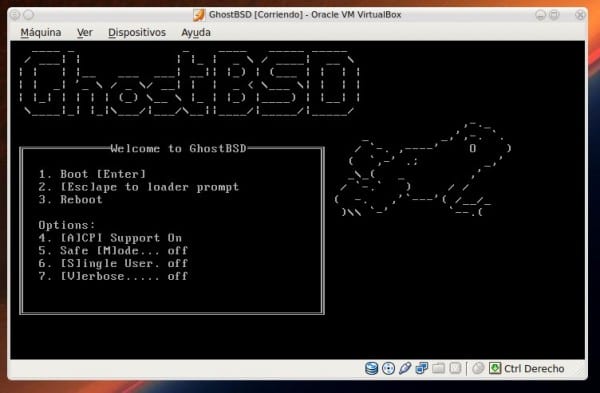
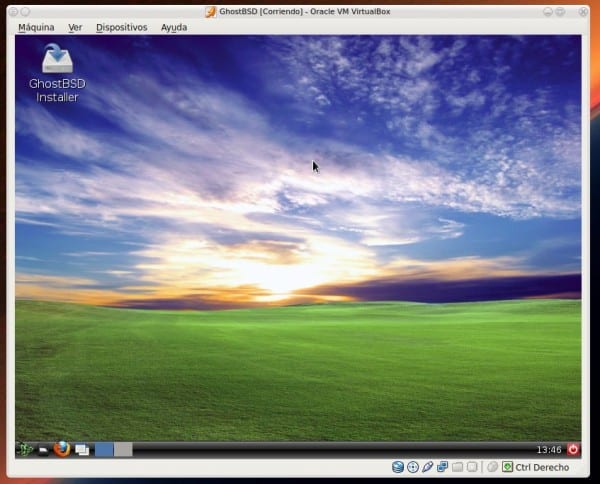
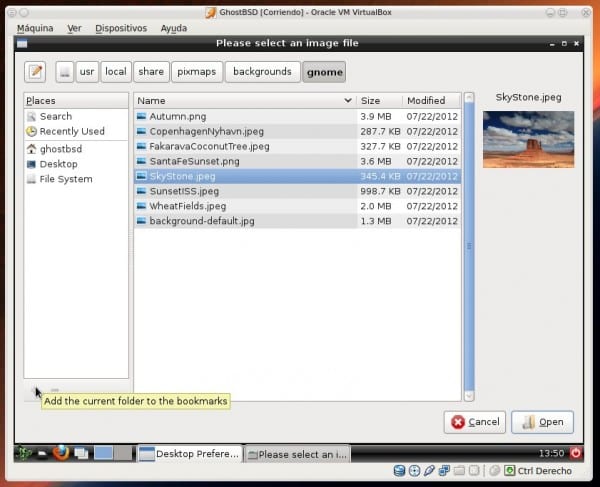
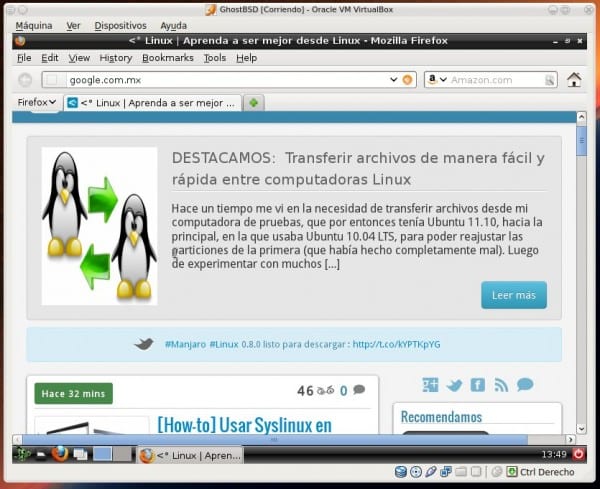
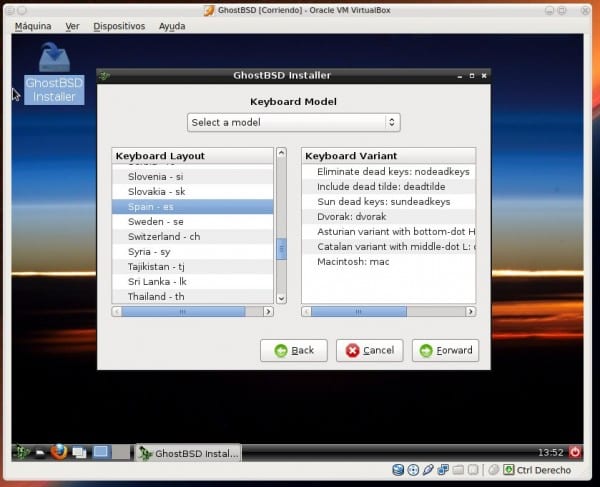
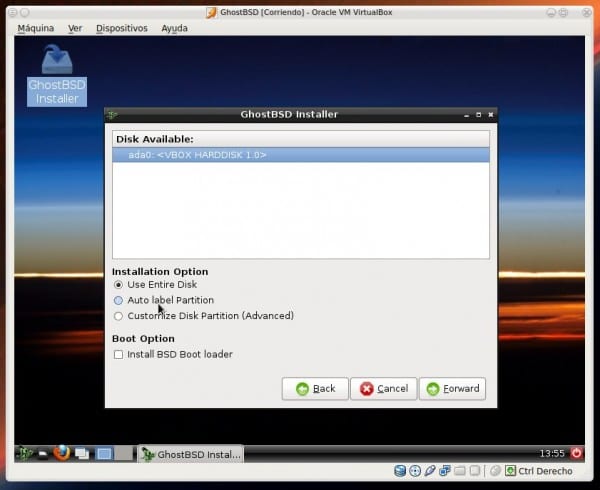
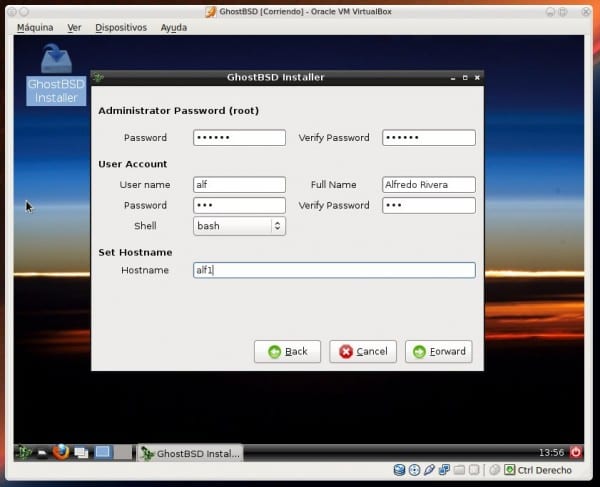
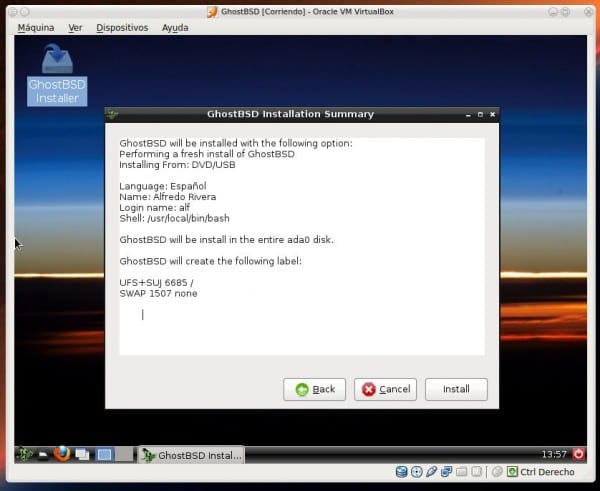
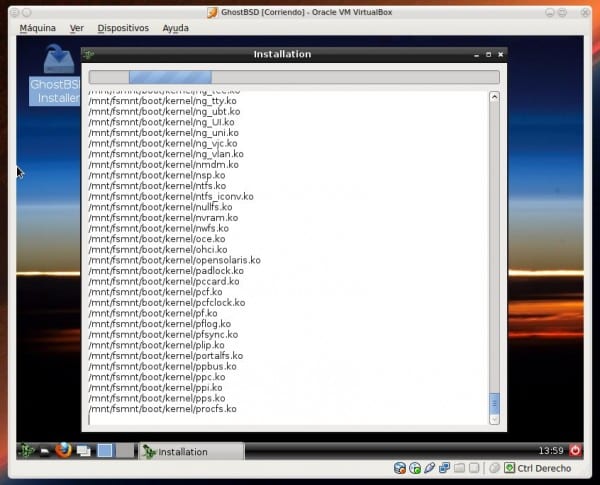

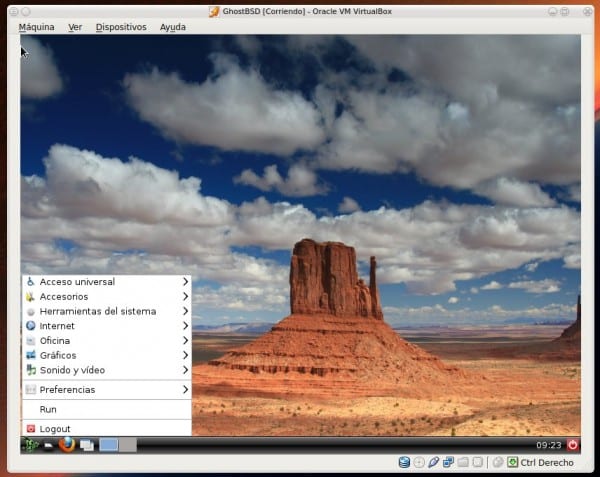
Well, the installer does not look difficult, is it rolling or how is it distributed and updated?
What a coincidence, I was downloading GhostBSD right now to test it and I come across this article xD
It strikes me to use one of the BSDs (freebsd to be specific) but I want to know how BSDs get along with PCs, that is to say, what is the difference with ArchLinux (which is the distro that I currently occupy), how it works or others. The question arises from an article that I read (I don't remember where) that mentions that BSD is the most similar to UNIX there is and that Linux is rather a derivative of UNIX, so I am a little afraid of migrating to BSD
BSDs are not the closest thing to UNIX, it is that they are UNIX. They are direct derivatives.
Greetings notfrombroklyn and Rots87 !! Well, in the case of BSD, it is not that they are derived from Unix, it is that they "ARE" the basis of Unix, a large amount of the original code of what was Unix was developed by the University of Berkley and that later with the going and Coming from "who owns it", Berkley developed their own variant based on the code they developed themselves and it was rewritten thus giving birth to BSD ... well, that's what I know.
As for similarities and differences with Linux, it is assumed that what we can do with Linux we should be able to do with BSD, although having to fiddle with more, since we may have to compile a lot of software by hand. Here I see 2 options to start with BSD, the first, for what they come from linux maybe it would be to install Debian kBSD, although from what I saw its installation is more cumbersome than the one presented by Alf today here in GhostBSD, the second would be to test the BSD versions for "mere mortals", I heard once from DragonFly, but today I see much more "mortal" this one from Ghost.
I would advise that we do what many of us did when we learned about Linux, use a LiveCD, see how it behaves, maybe install a virtual machine and well, if it convinces us to make the big leap… «the installation !!!
Greetings and I hope these data serve !!
I must confess that * BSD is a pending task that I have, which happens because of the simple fact of not having my own computer, and having to be saving my data due to the File System change issue, because it makes me stop.
Well FreeBSD is a great option and it should be a system that should not be missed any Unixero, I have been using it for a long time and it is very good, only the packages a little outdated next to the most famous Linux distributions
regards
I, like elav, have not dedicated the time to BSD that it deserves, but I hope that with the release of Debian kBSD and its multi-arch packages and this post by Alf not only me, if not more people are encouraged, even to know it ...
Hopefully hackloper775 wants to share with us more about its experience with BSD, since when it has been used, the pros and cons it has had and its suggestions regarding BSD
Khourt, I have tried the Debian kfreebsd. Many people like it, I was disappointed. I've wanted to try FreeBSD for a long time, but haven't made up my mind yet.
What problems did you have? Tell us, because it was something you wanted to try 🙁
Yes Yes Yes !! Tell us, what was it that disappointed you (see that I had high hopes ...)
I mean, maybe I will venture, but having a review from someone who already uses it, I will already know what I am facing
in my case it is the same. I tried installing PCBSD and FreeBSD, but in both cases a kernel panic prevented me from installing the system. I checked the official forums several times and searched the net, but never found the solution. apparently BSD doesn't get along with my Dell.
Ummm, download it to see how it goes!
Greetings and thanks for the tip!
I installed two days ago on a PC-BSD 9.0 Isotope virtual machine, which installation is quite simple and gives you the option of installing various desktop environments and other utilities such as samba, I have not had time to fiddle with it yet,
but looking for information about BSD I have not found much documentation in Spanish
I was going to talk about PC-BSD, which seems even simpler than this GhostBSD. Have you already had an eye on it? http://www.pcbsd.org/es/
By default it has KDE, although it has the other environments as Davidlg said, and installing a program is as simple as downloading an executable from its repository, and clicking Next -> Next.
I tried it a long time ago and I confess that I was surprised by its ease of use.
With respect to BSDs, what convinces me the most is PCBSD, but of course, if I install something I need all my hardware to support both intel graphics and Wi-Fi (and it doesn't seem to be its strong suit).
BSDs are still light years away from any GNU / Linux in terms of desktop multimedia support and esoteric hardware, you have to have a very definite reason to use BSD and in this case it will surely be due to one of the FreeBSD derivatives (Open , Net, DragonFly, etc.) because it makes no sense to use FreeBSD unless one needs ZFS with the tremendous GNU / Linux distro out there! 😀
Or mount a server !! Since as we know, BSD is characterized by offering greater security, specifically OpenBSD, or was it NetBSD ??? I had to check the security analyzes of today.
And as for BSD being years away, I will only tell you that it is assumed that the same source code of many applications can be compiled in BSD, although of course, the end user is more worked on Linux
You made me remember when I used a little FreeBSD (what times) xD
Good article. I tried pc-bsd for 1 month and I liked it, but the packaging is a bit old. Otherwise it feels fast, fluid, stable and very easy to use. I hope there are more articles like this.
BSD is recommended to mount servers, for users it can also be used but it has much less support than linux in the section on using it as a desktop system. I was testing pc-bsd and although it looks like linux, it is not the same, since it works differently in certain aspects. Even if you come from Linux, you should have a good time to learn it.
Thanks Alf, for the information, I will be following your notes on how your BSD behaves, and it is good that we not only stay on Linux, because we must recognize that there is a world outside of GNU / Linux to know, BSD, Indiana, Minix ...
If you can tell me how GhostBSD vs DragonFly and Pc-BSD are going
–Khourt If you can tell me how GhostBSD vs DragonFly and Pc-BSD are going, -
I will hardly compare distros with the classic xxx vs xxx, since each distribution has its own.
What I could do in any case is to show how the process here, comment that it seemed to me, and at most say if I will continue to use it, since everyone can use it and draw their own conclusions about whether it is comfortable to use one or another distro.
An apology for the spelling mistakes, since the keyboard stayed in I don't know what language and I can't find the accents.
regards
An apology Alf, and what a good success and clarify the "versus", only that I was referring more to a practical comparison, for example I would start with the easy installation that you presented in Ghost, compared to FreeBSD 8 (which is what I tested does for a while), or the Debian kBSD text mode ... and another, we know that the packages are out of quality, but how about the compilation? Is it exactly the same as in Linux? I remember for example a problem that I had with a package a long time ago that asked for a dependency "XFree86" or something like that, which I think was the old version of Xorg ... do you fight with this one ?? And then also what about incorporating controllers? That the sources are supposed to work ... and all that we already know in theory, but what about in practice ???
Greetings and thanks for the prompt reply
In virtualbox it goes well, the issue comes when it is installed on a real machine, it is true that with nvidia at least pc-bsd manages it but neither the ati nor the intels are its strong suit and that without talking about the wireless, hopefully you can use the Windows drivers with that great invention that is ndisgen but, I said, hopefully. Without a doubt, BSD is more focused on the server than the desktop, although pc-bsd and ghostbsd are making a great effort to simplify things.
I personally like pc-bsd a lot, it allows you to have a beer from time to time. It is true that it has the app-café but it also has the ports for the days that we wake up wanting to work a little. I hope these projects last.
Good article. The truth is that I no longer venture to another Operating System. The move to Linux was already somewhat complicated to stir things up in my head again.
Well, if you stop to think about it, they are not, so complicated, since to begin with in the basic sense it is very similar to GNU / Linux, similar desktops, KDE, Gnome, LXDE, E17, with WinMangers too, OpenBOX, Flux , RazorQT,… .etc and basically it also has repositories, and the program that you can't find because you compile it (which maybe this is what could complicate things a bit). The thing is adventure and knowing a system, its structure, form and tools, but as I mentioned before, we can try it from a Live CD and a virtual machine, and if we like it, then everyone decides.
If you also had debian in mind, then you can try Debian gnu / kfreebsd
Someday I'll try BSD, I don't think the change is that hard, but in console mode the changes should be appreciated more. For more then the opportunity to Plan 9, that would be interesting 🙂
Alpha:
Greetings and thanks for the article. Just one detail that I share: the verb to express that something "slows down" is not "encourage" (as you use it in your article) but SLOW and SLOW. 😉
Is it encouraging the slowdown?
I also suffered from "versionitis" and tried many distros before deciding to let the "Güin2" never try a BSD, my final option and with which my portable machine "flies" is LM-13-KDE-64 with kernel 3.5.3 and KDE 4.9.0 I left it as the only OS
I recommend it for beginners like me.
PCBSD!
At the moment I use ubuntu for lazy and I plan to put minnetbook winbugs for work reasons but I am comparing ghostbsd and pcbsd to install in my neetbook when I see which one manages to identify everything that I occupy as the evil perverse integrated wireless card; Well, although I started in Linux as a worthy debianite and later as an ultra worthy slackero (slackware was beautiful x3), I got to know OpenBSD and freeBSD and fell in love, I got to the point of putting OpenBSD on my pc and half managing to put it as a desktop system with everything and multimedia and I put my grandfather on freeBSD for a while it was funny to see how we could do almost nothing despite the fact that with weeks of ingenuity I managed to make it very similar to his windows xDD. I am OpenBSDero and freeBSDero at heart> u <, by the way OpenBSD is based on NetBSD and DragonflyBSD I dare to say that it is even more difficult than the so discriminated openbsd because it is to work by nodes putting the HD in a computer, the internet in another and like this: P. Greetings from my evil perverse ubuntu and I apologize for the spelling mistakes but it's 1.12 in the morning and with work I hit the keyboard ...
you should see clarified that all bsd systems are not gnu / linux, because some people can get confused
interesting
Well, right now I'm with the ArchBsd rubber, it's good apart from that it's rollingrelease, but I'm stuck I don't understand anything I'm a linux user but well right now I'm in these if someone wants to give me a welcome hand, be it because for example I have not been able to install the terminator, we see over there bye
By the way, the new version of GhostBSD 4 RELEASE is out, it's very good.
My old Asus EeePC 1201HA with 2Gb of RAM was too slow with Windows 7, and it also got hot. I tried Windows 8.1 and was not convinced, although it was a bit lighter. With Linux there is a problem and it is that the new editions are becoming heavier. Linux mint stopped being useful to me. Finally, by installing Gosht BSD 4.0, my team rejuvenated. It comes with the bare minimum that is needed. I still do not clarify with the repositories, but for now I have not needed either. One issue is that you have to arrange to read NTFS files, even though it reads FAT partitions fine. My opinion is that it is solid and stable. It reminds me a bit of the first computer I had, a Macintosh LC-III.
A warning: Although it is a UNIX the commands are not the same as in Linux. Command console help is fine.
BSD is not linux, it is UNIX
and they are not called Distros or Distributions.
they are complete operating systems.
Unlike a Linux distribution is the Kernel (the Linux itself) and the package of programs grouped in an environment, BSD is a fully developed system
I just left ubuntu 18.04, and a failed installation of windows 10 dr lite, testing Ghostbsd, the truth is that I quickly install live, then I notice it light on the disk, on a Dell Gx 680 optiplex, 3 gigs of ram goes like silk, with firefox, 64 bits, I imagine it must fly on new machines! The last time I tried something similar was freebsd in 2011, well we'll see if we stay, that if the other discs I don't see, they are in other formats ...